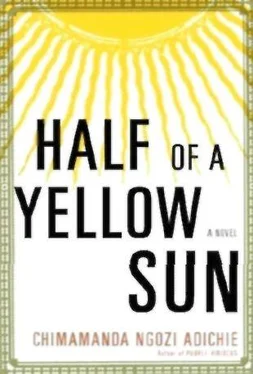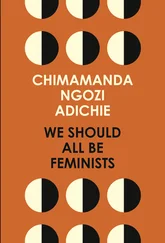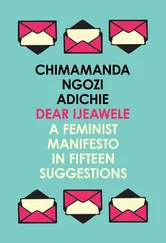"Let's go!" Ugwu called out, wiping his bloodied hands on his trousers.
The others thumped him on the back and called him "Target Destroyer!" as they trooped to headquarters to hand in their cables.
"You learn this from that book you read?" they teased. Success hauled him up above the ground. He floated through the following days as they played Biafran whot and drank gin and waited for the next operation. He lay face up on the ground while High-Tech rolled up some wee-wee, the leaves crisply dried, in old paper and they smoked together. He preferred Mars cigarettes; the wee-wee made him feel disjointed, created a thin slice of space between his legs and hips. They didn't bother to hide their smoking because the commander was happy and the news was hope-filled now that Biafra had recaptured Owerri from the vandals. Rules relaxed; they could go out to the bar near the expressway.
"It's a long walk," somebody said, and High-Tech laughed and said, "We will commandeer a car, of course."
When High-Tech laughed, Ugwu remembered he was a child. Only thirteen. Among nine men he looked incongruously small, Ugwu thought, as they walked along. The sound of rubber slippers echoed on the silent road. Two of them were barefoot. They waited awhile before a dusty Volkswagen Beetle drove toward them and then spread across the road and blocked it. The car stopped, and a few of them banged on the bonnet.
"Get out! Bloody civilians!"
The man who was driving looked stern, as if determined to show that he could not be intimidated. Beside him, his wife began to cry and plead. "Please, we are going to look for our son."
A soldier was violently hitting the bonnet of the car. "We need this for an operation!"
"Please, please, we are going to look for our son. They told us he was seen in the refugee camp." The woman stared at High-Tech for a while, her brows furrowed. Perhaps she thought he might be her son.
"We are dying for you and you are here driving a pleasure car?" a soldier asked, pulling her out of the car. Her husband climbed out himself, but still stood by the car. His fist was tight with the key inside.
"This is wrong, officers. You have no right to take this car. I have my pass. I am working for our government."
One of the soldiers slapped him. The man staggered and the soldier slapped him again and again and again and he crashed to the ground and the key slipped out of his hand.
"It is enough!" Ugwu said.
Another soldier touched the man's neck and wrist to make sure he was breathing. The wife was bent over her husband as the soldiers squashed into the car and drove to the bar.
The bar girl greeted them and said there was no beer.
"Are you sure you don't have beer? Are you hiding it because you think we will not pay you?" one of the soldiers said to her.
"No, there is no beer." She was thin and sharp-featured and unsmiling.
"We destroyed the enemy!" he said. "Give us beer!"
"She has said there is no beer," Ugwu snapped. The soldier's loudness annoyed him; this was a man who had abandoned his ogbunigwe and run off long before the vandals were close. "Let her bring kai-kai"
As the girl set out the local gin and small metal cups, the soldiers talked about the Nigerian officers, about how they would hang Dan-juma, Adekunle, and Gowon upside down after Biafra 's victory. High-Tech began to roll some wee-wee. Ugwu thought he made out something familiar on an unrolled portion of paper, the word narrative, but it could not be. He looked again. "What paper is that?" he asked.
"It is only the first page of your book." High-Tech smiled and offered Ugwu the joint.
Ugwu did not take it. "You tore my book?"
"It is only the first page. My paper finished."
Rage pumped through Ugwu. His slap was swift, powerful, furious, but High-Tech avoided the full impact because he moved back at the last second and Ugwu's hand only scraped his cheek. Ugwu raised his hand again but the other soldiers held him, dragged him away, said it was just a book after all, told him to drink some more gin.
"Sorry," High-Tech mumbled.
Ugwu's head ached. Everything was moving so fast. He was not living his life; life was living him. He drank steadily and watched the others, their mouths opening and closing, rancid jibes and conceited boasts and magnified memories coming out of them. Soon the bar itself, the benches placed around a table, became a sour-scented blur. The bar girl changed the bottles one after the other; Ugwu thought the gin was probably brewed in their backyard down the road. He got up to urinate outside and, afterward, leaned against a tree and breathed in the fresh air. It was like sitting in the backyard in Nsukka, looking at the lemon tree and his herb garden and Jomo's manicured plants. He stayed there for a while until he heard loud shouts from the bar. Perhaps somebody had won some bet or other. They tired him. The war tired him. When he finally went back inside, he stopped at the door. The bar girl was lying on her back on the floor, her wrapper bunched up at her waist, her shoulders held down by a soldier, her legs wide, wide ajar. She was sobbing, "Please, please, biko." Her blouse was still on. Between her legs, High-Tech was moving. His thrusts were jerky, his small buttocks darker-colored than his legs. The soldiers were cheering.
"High-Tech, enough! Discharge and retire!"
High-Tech groaned before he collapsed on top of her. A soldier pulled him off and was fumbling at his own trousers when somebody said, "No! Target Destroyer is next!"
Ugwu backed away from the door.
" Ujo abiala o! Target Destroyer is afraid!"
Ugwu shrugged and moved forward. "Who is afraid?" he said disdainfully. "I just like to eat before others, that is all."
"The food is still fresh!"
"Target Destroyer, aren't you a man? I bukwa nwoke?"
On the floor, the girl was still. Ugwu pulled his trousers down, surprised at the swiftness of his erection. She was dry and tense when he entered her. He did not look at her face, or at the man pinning her down, or at anything at all as he moved quickly and felt his own climax, the rush of fluids to the tips of himself: a self-loathing release. He zipped up his trousers while some soldiers clapped. Finally he looked at the girl. She stared back at him with a calm hate.
There were more operations. Ugwu's fear sometimes overwhelmed him, froze him. He unwrapped his mind from his body, separated the two, while he lay in the trench, pressing himself into the mud, luxuriating in how close and connected he was to the mud. The ka-ka-ka of shooting, the cries of men, the smell of death, the blasts of explosions above and around him were distant. But back at the camp his memory became clear; he remembered the man who placed both hands on his blown-open belly as though to hold his intestines in, the one who mumbled something about his son before he stiffened. And, after each operation, everything became new. Ugwu looked at his daily wrap of garri in wonder. He read pages of his book over and over. He touched his own skin and thought of its decay.
One afternoon, the commander's jeep drove in with a sickly goat lying on its side, legs tied together. It had been commandeered from an idle civilian. It bleated meekly and the soldiers gathered, excited at the thought of meat. Two of them killed it and made a fire and when the large-cut chunks had been cooked, the commander asked that all of it be brought to his quarters. He spent long minutes checking through the basin to make sure the goat was complete: the legs, the head, the balls. Later, two village women came and were taken in to the commander's quarters; much later, the soldiers threw stones at them as they left. Ugwu dreamed that the commander had given half of the goat to the soldiers and that they had chewed everything and swallowed the bones.
Читать дальше












